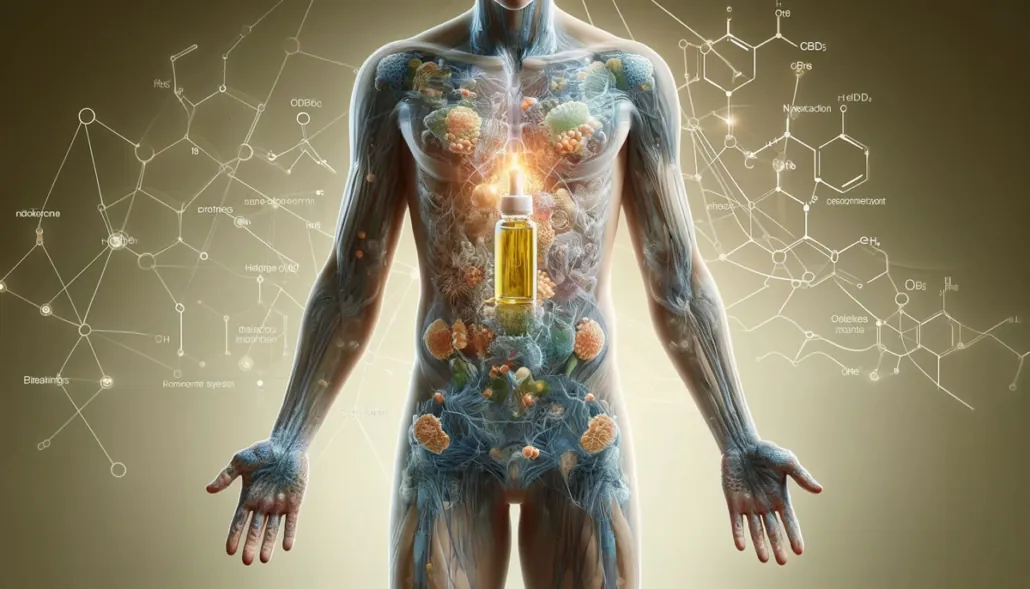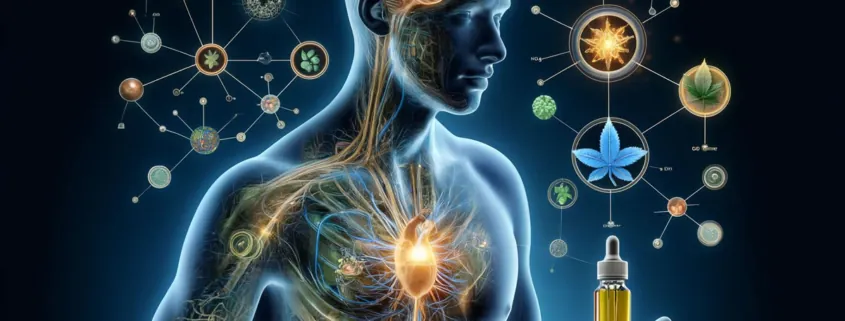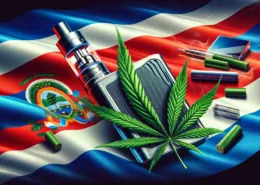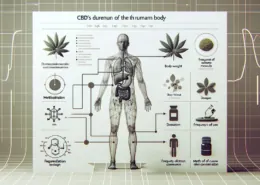How CBD Oil Works in the Body: Unlocking Its Potential
Cannabidiol (CBD) oil has taken the health and wellness world by storm, with many individuals turning to this natural remedy to support their overall well-being. But how exactly does CBD oil work within the human body? In this comprehensive guide, we’ll dive into the fascinating world of CBD and explore its interactions with various biological systems, helping you understand how this remarkable compound can contribute to achieving optimal health.
Understanding CBD Oil
CBD, or cannabidiol, is distinguished from THC by its non-psychoactive nature. It is one of many cannabinoids found in the cannabis plant, which includes both marijuana and hemp. While CBD oil has gained popularity for its potential health benefits, it is not simply a nutritional supplement; it has therapeutic properties that may assist with a variety of health conditions.
Also Read:
What is CBD Oil? A Comprehensive Guide
The Endocannabinoid System: Your Body’s Balancing Act
At the heart of CBD’s effects on the body lies the endocannabinoid system (ECS), a complex network of receptors, endocannabinoids, and enzymes that work together to maintain homeostasis—the state of internal balance essential for proper functioning (1). The ECS plays a crucial role in regulating a wide range of physiological processes, including:
- Appetite and digestion
- Metabolism
- Chronic pain
- Inflammation and immune system responses
- Mood
- Learning and memory
- Motor control
- Sleep
- Cardiovascular system function
- Muscle formation
- Bone remodeling and growth
- Liver function
- Reproductive system function
- Stress
- Skin and nerve function (2)
When the ECS is functioning optimally, your body is better equipped to handle both internal and external stressors, promoting overall health and well-being.
CBD Oil: A Key to Unlocking Your Body’s Potential
CBD, a non-psychoactive compound found in hemp and cannabis plants, interacts with the ECS in a unique way. Unlike THC, which binds directly to cannabinoid receptors (CB1 and CB2), CBD takes a more indirect approach. Scientists believe that CBD works by slowing down the breakdown of endocannabinoids, the body’s naturally produced cannabinoids, allowing them to have a more prolonged and efficient effect on the system (3).
By enhancing the availability of endocannabinoids, CBD oil can help optimize the functioning of various biological systems, leading to potential benefits such as:
- Reduced inflammation (4)
- Improved mood (5)
- Better sleep (6)
- Enhanced focus and clarity (7)
- Reduced anxiety and stress (8)
- Pain relief (9)
In addition to its influence on the ECS, CBD also interacts with other important receptors in the body, including:
- Dopamine receptors, which regulate mood and potentially addiction (10)
- Opioid receptors, which modulate pain (11)
- Serotonin receptors, which affect mood, anxiety, and possibly addiction (12)
The multifaceted nature of CBD’s interactions within the body highlights its potential as a versatile tool for promoting overall health and addressing a variety of concerns.

The Different Faces of CBD Oil
Not all CBD oils are created equal. Depending on the extraction method and the presence of other compounds, CBD oil can be classified into several categories:
- Full-spectrum CBD oil: Contains CBD, THC (less than 0.3%), and other beneficial compounds like terpenes and flavonoids.
- Broad-spectrum CBD oil: Contains CBD and other beneficial compounds, but no THC.
- CBD isolate: Pure CBD, without any other compounds from the hemp or cannabis plant.
Each type of CBD oil offers unique benefits, and the ideal choice will depend on your individual needs and preferences. Full-spectrum and broad-spectrum CBD oils are often sought after for their potential to create an “entourage effect,” where the various compounds work synergistically to enhance the overall therapeutic benefits (13).
Finding Your Optimal CBD Oil Experience
When incorporating CBD oil into your wellness routine, it’s essential to consider factors that can influence its effectiveness, such as:
- The quality and potency of the CBD oil
- The method of consumption (sublingual, ingestion, inhalation, or topical application)
- Your individual body chemistry and weight
- The dosage and frequency of use (14)
Working with a knowledgeable healthcare professional can help you navigate these variables and find the approach that works best for you. They can offer guidance on dosage, monitor your progress, and help you adjust your regimen as needed to achieve optimal results.
A New Era of Health and Wellness
As research continues to unravel the mysteries of CBD and its interactions with the human body, the potential for this natural compound to revolutionize our approach to health and wellness grows exponentially. By understanding how CBD oil works and harnessing its power to support the intricate balance within our bodies, we stand at the forefront of a new era in holistic well-being.
So, whether you’re seeking relief from chronic pain, looking to manage stress and anxiety, or simply aiming to optimize your overall health, CBD oil may hold the key to unlocking your body’s innate healing potential. Embrace the journey of discovery and take the first step towards a more vibrant, balanced life with the power of CBD oil.
References
1. Sallaberry, C. A., & Astern, L. (2018). The Endocannabinoid System, Our Universal Regulator. Journal of Young Investigators, 34(5), 48-55. https://doi.org/10.22186/jyi.34.5.48-55
2. Aizpurua-Olaizola, O., Elezgarai, I., Rico-Barrio, I., Zarandona, I., Etxebarria, N., & Usobiaga, A. (2017). Targeting the endocannabinoid system: future therapeutic strategies. Drug Discovery Today, 22(1), 105-110. https://doi.org/10.1016/j.drudis.2016.08.005
3. Leweke, F. M., Piomelli, D., Pahlisch, F., Muhl, D., Gerth, C. W., Hoyer, C., Klosterkötter, J., Hellmich, M., & Koethe, D. (2012). Cannabidiol enhances anandamide signaling and alleviates psychotic symptoms of schizophrenia. Translational Psychiatry, 2(3), e94. https://doi.org/10.1038/tp.2012.15
4. Booz, G. W. (2011). Cannabidiol as an emergent therapeutic strategy for lessening the impact of inflammation on oxidative stress. Free Radical Biology and Medicine, 51(5), 1054-1061. https://doi.org/10.1016/j.freeradbiomed.2011.01.007
5. Crippa, J. A., Guimarães, F. S., Campos, A. C., & Zuardi, A. W. (2018). Translational Investigation of the Therapeutic Potential of Cannabidiol (CBD): Toward a New Age. Frontiers in Immunology, 9, 2009. https://doi.org/10.3389/fimmu.2018.02009
6. Shannon, S., Lewis, N., Lee, H., & Hughes, S. (2019). Cannabidiol in Anxiety and Sleep: A Large Case Series. The Permanente Journal, 23, 18-041. https://doi.org/10.7812/TPP/18-041
7. Osborne, A. L., Solowij, N., & Weston-Green, K. (2017). A systematic review of the effect of cannabidiol on cognitive function: Relevance to schizophrenia. Neuroscience & Biobehavioral Reviews, 72, 310-324. https://doi.org/10.1016/j.neubiorev.2016.11.012
8. Blessing, E. M., Steenkamp, M. M., Manzanares, J., & Marmar, C. R. (2015). Cannabidiol as a Potential Treatment for Anxiety Disorders. Neurotherapeutics, 12(4), 825-836. https://doi.org/10.1007/s13311-015-0387-1
9. Russo, E. B. (2008). Cannabinoids in the management of difficult to treat pain. Therapeutics and Clinical Risk Management, 4(1), 245-259. https://doi.org/10.2147/tcrm.s1928
10. Bloomfield, M. A. P., Ashok, A. H., Volkow, N. D., & Howes, O. D. (2016). The effects of Δ9-tetrahydrocannabinol on the dopamine system. Nature, 539(7629), 369-377. https://doi.org/10.1038/nature20153
11. Elikottil, J., Gupta, P., & Gupta, K. (2009). The Analgesic Potential of Cannabinoids. Journal of Opioid Management, 5(6), 341-357. https://www.ncbi.nlm.nih.gov/pmc/articles/PMC3728280/
12. Patel, S., & Hillard, C. J. (2009). Role of Endocannabinoid Signaling in Anxiety and Depression. Current Topics in Behavioral Neurosciences, 1, 347-371. https://doi.org/10.1007/978-3-540-88955-7_14
13. Russo, E. B. (2011). Taming THC: potential cannabis synergy and phytocannabinoid-terpenoid entourage effects. British Journal of Pharmacology, 163(7), 1344-1364. https://doi.org/10.1111/j.1476-5381.2011.01238.x
14. Millar, S. A., Stone, N. L., Bellman, Z. D., Yates, A. S., England, T. J., & O’Sullivan, S. E. (2019). A systematic review of cannabidiol dosing in clinical populations. British Journal of Clinical Pharmacology, 85(9), 1888-1900. https://doi.org/10.1111/bcp.14038









